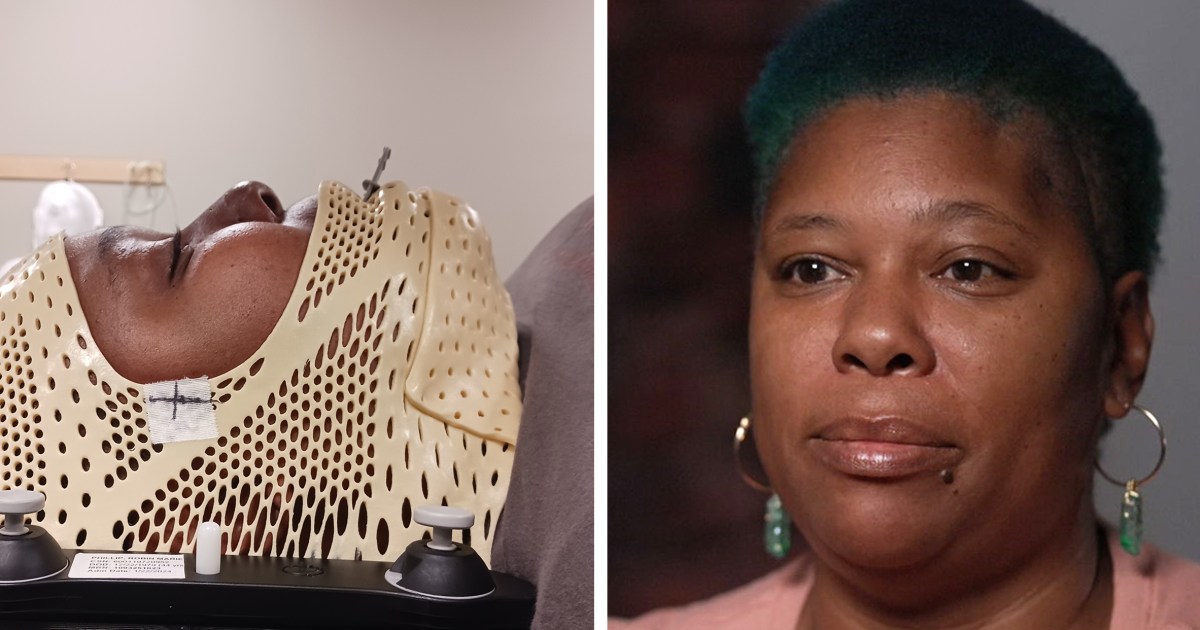Some women believe that the birth control shot caused their meningiomas, a tumor that grows from the lining of the brain.
Source link
Oct. 1, 2025, 5:00 AM EDTBy Abigail Brooks and Zinhle EssamuahWESTWEGO, Louisiana — Robin Phillip’s fresh haircut is dyed her favorite color — green. But beneath the dye job is a scar that runs along the side of her head, the result of two craniotomies. For years, Phillip, 45, suffered from what she thought were migraines. It wasn’t until early 2018, when she had to leave her warehouse shift to drive to the hospital, that she learned her headaches were a symptom of something more serious. She said she nearly crashed on the drive to the emergency room, blinded by pain. “The nurse said, ‘OK, what’s your pain from 1 to 10?’ I said 11, 12,” said Phillip. “They put me in the chair, and I don’t remember nothing after that.”Phillip awoke later to shocking news: She had an intracranial meningioma — a tumor of the lining of the brain. She needed emergency surgery.After the procedure, Phillip lost vision in her left eye and had to re-learn how to walk. Unable to work, she lost her apartment and moved in with her mother until she could get back on her feet. Robin Phillip during a radiation session in 2024. A mask holds her head in place for the treatment.Courtesy Robin Phillip“I was feeling lost, because where would I have possibly gotten a tumor from? I had a regular life. I did regular things,” she said. “What could have possibly caused this to happen to me?”Today, Phillip believes her birth control is to blame. For nearly 30 years, stopping only when she had her two children, she used Depo-Provera — a progestin shot given three times a year. She’s one of more than 1,000 women suing Pfizer, which makes the drug, alleging the company knew more about the risks and failed to warn users. Pfizer has moved to have the suit dismissed, arguing the case is pre-empted by a Food and Drug Administration decision, and says it stands behind the safety and efficacy of Depo-Provera.According to the Centers for Disease Control and Prevention, 1 in 4 sexually active women in the United States have used Depo-Provera. Black women use it at nearly double the national rate. Meningiomas are usually not cancerous — meaning they don’t spread to other parts of the body — but they can be harmful depending on their size and where they grow. Phillip’s tumor was pressing on her optic nerve, causing vision problems.Recent researchIn recent years, several studies have shown a possible link between Depo-Provera use and an increased risk of developing meningioma. One of them, published earlier this month in JAMA Neurology, linked medroxyprogesterone acetate (MPA), the drug in Depo-Provera, with a twofold increase in risk for meningioma. The risk was greatest in women who used the contraceptive for more than four years or started after age 31.Another one, a 2024 study published in the The BMJ based on French data, found a fivefold increase in risk for meningioma for long-term Depo-Provera users. Doctors caution that the studies are observational, meaning they cannot prove the medication caused the tumors. Dr. David Raleigh, a radiation oncologist who specializes in brain tumors and who is the chair of meningioma research at the University of California San Francisco’s Department of Radiation Oncology, said that female sex hormones — progesterone in particular — are linked to meningioma. (Progestin, the hormone in Depo-Provera, is a synthetic version of progesterone.) Meningiomas are the only brain tumors that are more common in women than in men, he added.Still, Raleigh said this doesn’t necessarily mean that progesterone is causing a meningioma to form. “All the available data suggest that progesterone is fuel on the fire,” he said. “Progesterone didn’t necessarily start the fire, but the available data suggest that it’s like dumping gas on it.” He said that the recent studies linking Depo-Provera to meningioma give him pause.“Those of us in the business often recommend that patients with meningioma avoid hormone replacement therapy, use nonhormone based means of contraception, if possible, and to be cautious with pregnancy and fertility planning because of these very well documented associations,” he said. “These new studies only amplify those concerns and considerations.”The overall risk of developing meningioma remains small: About 39,000 meningiomas are diagnosed each year in the U.S.“Overall, meningioma is not common. This is not a type of tumor that we see very often,” said Dr. Colleen Denny, an OB-GYN at NYU Langone Health. “The likelihood of having a meningioma as a Depo user is incredibly low. It’s just that it’s incredibly, incredibly low for people who don’t use Depo.”The American College of Obstetricians and Gynecologists (ACOG) published a response to The BMJ study urging caution, saying that, “according to the study, five out of 10,000 women using medroxyprogesterone acetate may possibly develop meningioma compared to one out of 10,000 women not using the medication.”“The risk that they’re finding is incredibly small,” said Dr. Nisha Verma, senior adviser for reproductive health policy for advocacy at ACOG. “I think it is a consideration we can talk to patients about, among all of the considerations that patients go through.”“Uterine cancer is a lot more common than meningioma, and Depo reduces your risk of uterine cancer. So how do you balance that?” Denny said. “It’s complex, and it often depends on the individual patients.”Phillip says even that small risk would have been too much for her.“If I would have [known] from the get-go, I would have never took that shot,” she said. The lawsuitPhillip is now one of more than 1,000 women suing Pfizer, the maker of Depo-Provera, alleging that the company failed to warn them about the risk. “These women all have meningiomas. Many have surgery, some have radiation, and they’ve all had their lives greatly impacted,” said Ellen Relkin, a lawyer representing Phillip and some of the other plaintiffs. Phillip’s lawsuit points to several studies dating as far back as 1983 showing a link between progesterone and meningioma. The lawsuit says those studies created an “unassignable duty to investigate,” and that Pfizer should have studied the risks associated with Depo-Provera sooner. Phillip needed two surgeries to remove a meningioma. A scar from the operations runs down the side of her head.NBC News“Defendants willfully, wantonly, and intentionally conspired, and acted in concert, to ignore relevant safety concerns and to deliberately not study the long-term safety and efficacy of Depo-Provera, particularly in chronic long-term users of Depo-Provera,” the complaint says. Verma, of ACOG, said that hormonal birth control is well-studied before it hits the market.“Birth control methods that are commercially available have been studied extensively before becoming available to the public, and so we’ve studied every type of birth control. We’ve looked at safety measures,” she said. “We have guidelines that do intensive reviews of all of the data and help us support patients in what methods may be safer for them.”In a statement to NBC News, Pfizer said it stands behind the “safety and efficacy of Depo-Provera.” In a court filing earlier this month, the company asked a judge to dismiss the case, saying that it became aware of the risks of meningioma associated with Depo-Provera in 2023, and submitted an application to the Food and Drug Administration to add a warning to the drug’s label. The application also requested adding warnings to two pills containing much lower doses of MPA. The FDA denied that request, according to the filing.The FDA declined NBC News’ request for comment, but in its denial letter to Pfizer, which is included in company’s filing, it said: “The findings of the available observational studies alone do not support the addition of a warning on Meningioma risk to medroxyprogesterone acetate (MPA)-containing products.”A spokesperson for Pfizer told NBC News that because of the FDA’s denial, federal law pre-empts the company from changing the warning label on Depo-Provera.In an interview with NBC News, Phillips’ lawyer Relkin said Pfizer had enough information to study the possible risks associated with Depo-Provera on its own before 2023 and accused the company of making an “overbroad and half-baked” effort to warn patients by submitting an application to add a warning label to every medication containing MPA.“Depo-Provera is 150 milligrams. Three, four times a year, a very high dose,” Relkin said. “There are low-dose, 2.5 and 5 mg pills, where there’s no data showing that they cause a problem.”“The dose makes the poison,” she added. “By asking to change the label for all, they were inviting a rejection.”Pfizer denied that accusation in its court filing. “If FDA truly thought a meningioma warning was necessary for some products (and not others) … FDA could have ‘promptly’ communicated to Pfizer,” it wrote.Changes abroad Outside of the U.S., however, changes have been made to Pfizer’s label.The European Medicines Agency added meningioma as a “possible side effect” of drugs with high doses of medroxyprogesterone acetate in 2024, and Pfizer went on to communicate that risk to doctors in the European Union. Canada’s label for the drug, updated in 2024, includes meningioma in its “warnings and precautions” section, stating that “meningiomas have been reported following long-term administration of progestins, including medroxyprogesterone acetate.”In January, South Africa’s drug regulatory agency also recommended updating the drug label for MPA to include meningioma risk. Phillip’s lawsuit alleges that Pfizer knew of the potential risk years before those changes overseas were made, however, citing a 2006 Canadian drug label which lists meningioma as one of the “Post-Market Adverse Drug Reactions” — adverse events that are reported after a drug has already been approved. The 2006 label notes that “the nature of post-marketing surveillance makes it difficult to determine if a reported event was actually caused by DEPO-PROVERA.”“Just because something happened associated in time with something, it doesn’t mean that one thing caused the other,” said Dr. Janet Woodcock, a former FDA principal deputy commissioner. “It’s in a company’s best interest to put everything on there, because then if they’re sued, they’d say, ‘Well, it was in the fine print.’”Woodcock, who is not involved with the lawsuit, noted the FDA typically has the final word on drug labels.According to Pfizer’s court filings, the company resubmitted its application to the FDA in June 2025. Phillip, right, rings the bell on her last day of radiation treatment on March 25, 2024.Courtesy Robin Phillip“FDA has still not approved any meningioma warning, and Pfizer’s renewed request remains pending,” the filing said.Relkin said an earlier warning would have changed everything for Phillip and her other clients.After her surgery in 2018, Phillip continued to take Depo-Provera. Her doctors were unable to remove the entire tumor in 2018 and she needed a second surgery in 2022, followed by radiation treatment from 2022 to 2024.Even still, doctors weren’t able to remove the entire tumor because of how close it is to her optic nerve.Phillip says she continued taking Depo-Provera until she saw posts on social media in 2024 about the studies linking the drug to meningioma. Earlier this month, she had her first set of brain scans since going off the drug. She said her radiologist told her that the meningioma is shrinking. “My body is telling me, my head is telling me I don’t have that much pain like I used to have,” she said. Abigail BrooksAbigail Brooks is a producer for NBC News.Zinhle EssamuahZinhle Essamuah is a correspondent and anchor for NBC News.




